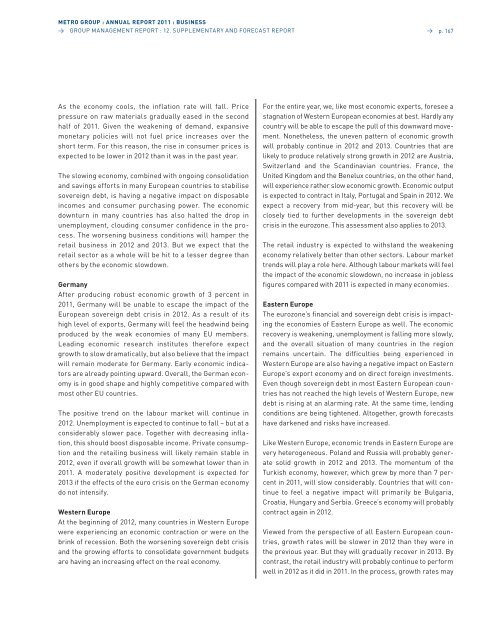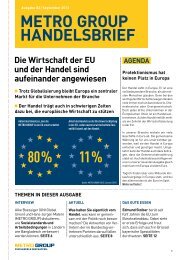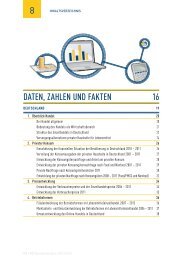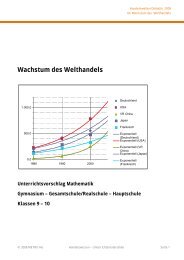pdf (22.8 MB) - METRO Group
pdf (22.8 MB) - METRO Group
pdf (22.8 MB) - METRO Group
Create successful ePaper yourself
Turn your PDF publications into a flip-book with our unique Google optimized e-Paper software.
<strong>METRO</strong> GROUP : ANNUAL REPORT 2011 : BUSINESS<br />
→ GROUP MANAGEMENT REPORT : 12. SUPPlEMENTARy ANd fOREcAST REPORT<br />
as the economy cools, the inflation rate will fall. price<br />
pressure on raw materials gradually eased in the second<br />
half of 2011. Given the weakening of demand, expansive<br />
monetary policies will not fuel price increases over the<br />
short term. For this reason, the rise in consumer prices is<br />
expected to be lower in 2012 than it was in the past year.<br />
The slowing economy, combined with ongoing consolidation<br />
and savings efforts in many european countries to stabilise<br />
sovereign debt, is having a negative impact on disposable<br />
incomes and consumer purchasing power. The economic<br />
downturn in many countries has also halted the drop in<br />
unemployment, clouding consumer confidence in the process.<br />
The worsening business conditions will hamper the<br />
retail business in 2012 and 2013. But we expect that the<br />
retail sector as a whole will be hit to a lesser degree than<br />
others by the economic slowdown.<br />
germany<br />
after producing robust economic growth of 3 percent in<br />
2011, Germany will be unable to escape the impact of the<br />
european sovereign debt crisis in 2012. as a result of its<br />
high level of exports, Germany will feel the headwind being<br />
produced by the weak economies of many eU members.<br />
leading economic research institutes therefore expect<br />
growth to slow dramatically, but also believe that the impact<br />
will remain moderate for Germany. early economic indicators<br />
are already pointing upward. overall, the German economy<br />
is in good shape and highly competitive compared with<br />
most other eU countries.<br />
The positive trend on the labour market will continue in<br />
2012. Unemployment is expected to continue to fall – but at a<br />
considerably slower pace. Together with decreasing inflation,<br />
this should boost disposable income. private consumption<br />
and the retailing business will likely remain stable in<br />
2012, even if overall growth will be somewhat lower than in<br />
2011. a moderately positive development is expected for<br />
2013 if the effects of the euro crisis on the German economy<br />
do not intensify.<br />
western Europe<br />
at the beginning of 2012, many countries in Western europe<br />
were experiencing an economic contraction or were on the<br />
brink of recession. Both the worsening sovereign debt crisis<br />
and the growing efforts to consolidate government budgets<br />
are having an increasing effect on the real economy.<br />
→ p. 167<br />
For the entire year, we, like most economic experts, foresee a<br />
stagnation of Western european economies at best. Hardly any<br />
country will be able to escape the pull of this downward movement.<br />
nonetheless, the uneven pattern of economic growth<br />
will probably continue in 2012 and 2013. Countries that are<br />
likely to produce relatively strong growth in 2012 are austria,<br />
switzerland and the scandinavian countries. France, the<br />
United Kingdom and the Benelux countries, on the other hand,<br />
will experience rather slow economic growth. economic output<br />
is expected to contract in Italy, portugal and spain in 2012. We<br />
expect a recovery from mid-year, but this recovery will be<br />
closely tied to further developments in the sovereign debt<br />
crisis in the eurozone. This assessment also applies to 2013.<br />
The retail industry is expected to withstand the weakening<br />
economy relatively better than other sectors. labour market<br />
trends will play a role here. although labour markets will feel<br />
the impact of the economic slowdown, no increase in jobless<br />
figures compared with 2011 is expected in many economies.<br />
Eastern Europe<br />
The eurozone’s financial and sovereign debt crisis is impacting<br />
the economies of eastern europe as well. The economic<br />
recovery is weakening, unemployment is falling more slowly,<br />
and the overall situation of many countries in the region<br />
remains uncertain. The difficulties being experienced in<br />
Western europe are also having a negative impact on eastern<br />
europe’s export economy and on direct foreign investments.<br />
even though sovereign debt in most eastern european countries<br />
has not reached the high levels of Western europe, new<br />
debt is rising at an alarming rate. at the same time, lending<br />
conditions are being tightened. altogether, growth forecasts<br />
have darkened and risks have increased.<br />
like Western europe, economic trends in eastern europe are<br />
very heterogeneous. poland and Russia will probably generate<br />
solid growth in 2012 and 2013. The momentum of the<br />
Turkish economy, however, which grew by more than 7 percent<br />
in 2011, will slow considerably. Countries that will continue<br />
to feel a negative impact will primarily be Bulgaria,<br />
Croatia, Hungary and serbia. Greece’s economy will probably<br />
contract again in 2012.<br />
viewed from the perspective of all eastern european countries,<br />
growth rates will be slower in 2012 than they were in<br />
the previous year. But they will gradually recover in 2013. By<br />
contrast, the retail industry will probably continue to perform<br />
well in 2012 as it did in 2011. In the process, growth rates may

















